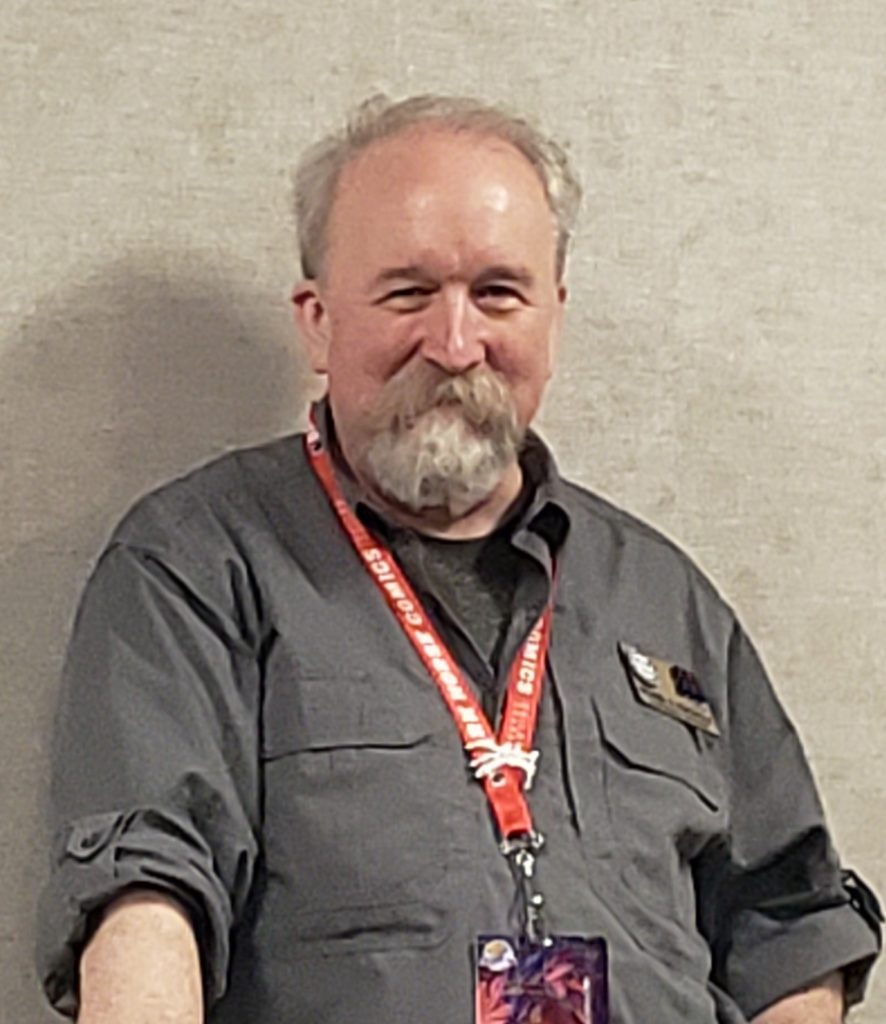Michael Stackpole and company presented the Dragon Con’s Writer’s Hourly Workshops beginning at 10AM to 6:30PM on Friday through Sunday, Hyatt Inman. More than a few brave souls, one of my best writing buddies and I included, took the plunge and sat in the first two rows for the entire series. As Stackpole said, if you sit in the front you’ll do better on the exam. (Pro Tip: there was NO exam.)

And we all got blue winner ribbons (as opposed to the whiner ribbon I said I deserved).
I took about 70 pages of notes in my composition notebook. I won’t present a blow-by-blow description of each workshop, but here are some highlights of the sessions.
This was my third time attending the workshops, although ten years ago and last year I only attended a few sessions. For 2024, I opted for the fully immersive experience. And yes, after three nine-hour days of workshops (including the half-hour breaks between each one; BYO snacks and H2O), I was more than a little wasted. But it was worth it. Most importantly for me, the workshops jump-started my creativity. Even with the usual stressors that attend Dragon Con along with us die-hards, I awoke the third morning with the rest of my current scene dancing along swimmingly in the full immersion that the workshops offered.
“Foundations of Success,” Michael Stackpole, Friday at 10AM:
The first foundation of writing success is a familiar one, “butt in chair” (BIC). The foundations for commercial publication are a bit more complex, beginning with market research and also including critical reading, eliminating distractions, writing first drafts without editing, cultivating writer friends, and the elements of revision.
Perhaps there is still hope?
“This Is How We Time/Space Travel and Other Chronological Pitfalls,” Bethany Kesler, Friday at 11:30AM:
Kesler, a historian and folklorist, apparently time travels in her spare time or at least she made it seem so. She was able to discuss choices and possibilities to favor: Is it okay to be vague? Should authenticity or just plausibility trump accuracy? If we’re exploring the “what if” breaking-off point of alternate history, what changes should an author consider making in the timeline? What impact would those changes have? Should I approach time from a fantasy or science fiction perspective?
When it came time to discuss the complexities of time travel from a pseudo-scientific perspective, this former humanities major’s eyes glazed over, but I still have pages of notes with words like “paradox” and “multiverse.” One can only hope, eh?
“Building A Solid Series,” Michael Stackpole, Friday at 1PM:
Stackpole said that if an author is successful, it’s possible to continue that success by building a series. He said there are multiple ways to do so, including an episodic series, the “river novel” that follows a place and its people through time, and the ever-popular epic series. He then described different types of characters and how they fit into the various series types. He reminded us to always plot ten years out.
Egad! Am I up to the challenge for my own series in progress? I sure hope so!
(To be continued. Only 15 workshops to go…)
